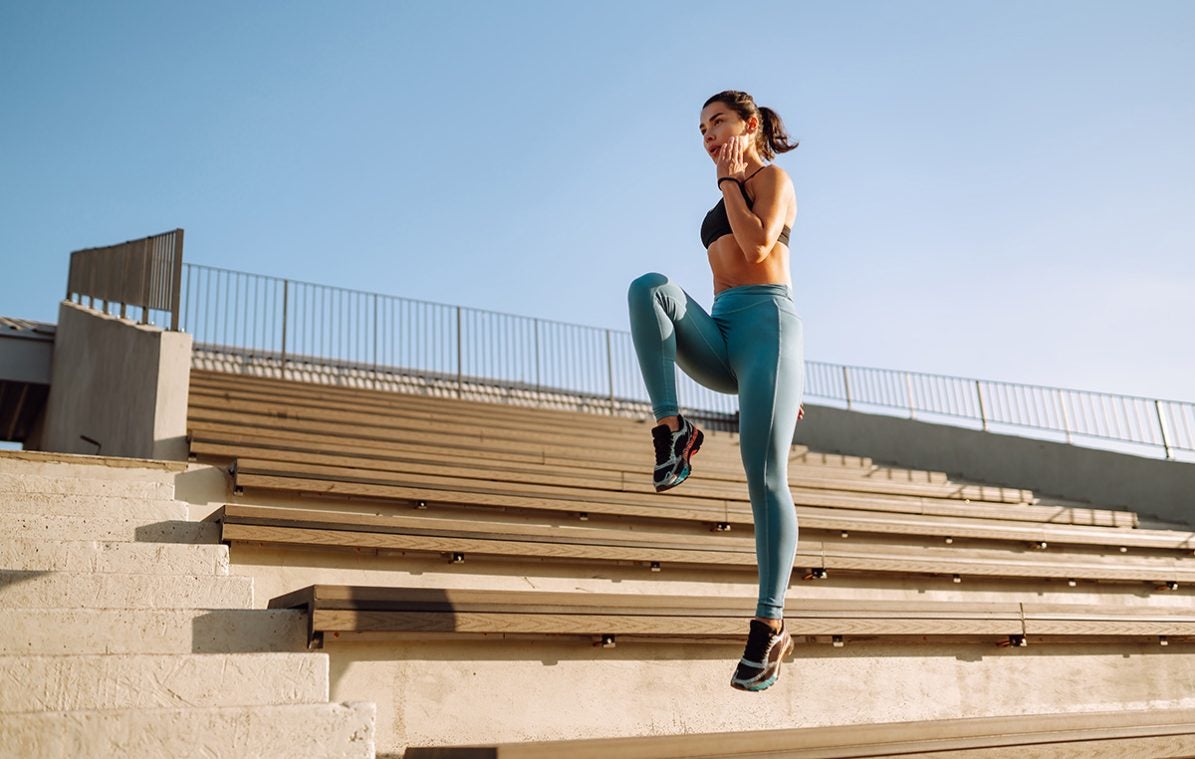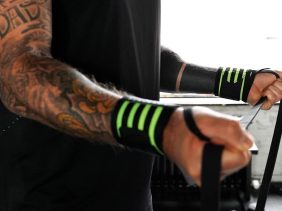30 Killer Ways to Stay in Shape for Summer
 Maksym Belchenko
Maksym Belchenko
Summer – we’ve been looking forward to it for so long and now it’s finally here. But even the nicest season can be quite challenging for your body. To help you stay fit and healthy through the summer months, we’ve put together 30 tips that can support your body. After all, it has to work a lot harder in the heat than during the winter. We reveal what’s good for it now, and what you’d be better off not doing. Have fun trying them out!
#1 Drink, drink, drink. It may not be the most original advice, but it’s even more important in the summer months than usual. This is because it’s not only more strenuous to follow through with your usual exercise routine when your body is dehydrated, it can actually be dangerous. That’s why you should drink up to 3 liters of liquid a day in the hot summer months, preferably water and unsweetened teas — or cold ginger tea. You’ll reap twice the benefits (see Tip #17).
And if you want that relaxed beach feeling as you cool down, try our refreshing CocoWhey. This isotonic drink provides you with 20 g of protein per serving and is perfect after training, or as a tasty summer drink between meals.
#2 Adapt your exercise routine for the summer. If it’s too hot for your usual HIIT training or gym workout, then try water sports. In addition to an all-over fitness program, they involve plenty of sun and cooling off. Besides swimming, there are plenty of alternatives like wakeboarding, water skiing, kayaking, surfing and standup paddle boarding — just try out what appeals to you.
#3 Pick a healthy ice cream alternative. You just can’t have summer without ice cream, but Nicecream is much healthier, sugar-free and even vegan. And it’s easy to make yourself: simply freeze bananas overnight, then mix them with peanut butter and a dash of water and blend until creamy. Your healthy summer refreshment is ready. Our peanut butter provides you with a whole 350 g of nuts full of protein power, without any sugar.
#4 Avoid the hottest hours for exercise. Move your workouts to the cooler morning and evening hours. Whether you’re sweating it out in the gym or burning calories with an outdoor workout, when temperatures rise in the summer, it pays to have your workout checked off by 10 am or, alternatively, to start at 7 or 8 pm. Your cardiovascular system will thank you.
#5 Choose warm drinks instead of cold ones. In hot temperatures, we like to reach for a cool drink. But this is actually rather counterproductive in the heat, as your body will also put in extra effort to heat up when it’s cold. Instead, you should choose warm drinks such as tea (mint tea, for example). They protect you from overheating as they dilate blood vessels and improve your blood’s ability to absorb fluids.
#6 Cool your bed linen before nighttime. A good night’s sleep also helps us feel more comfortable and fit during the day. But most people roll around sleeplessly in bed when temperatures outside remain tropical, even at night. Before going to bed on nights like these, it may help to put your bedding in a large plastic bag in the freezer for 20-30 minutes. This is because your body can also cool down faster in a cooled environment.
#7 Eat dinner, but the right way. Heavy meals in the evening combined with warm temperatures at night are a real sleep killer. This is why you should eat light and balanced meals in the evening. Focusing on foods that contain tryptophan (the precursor to the sleep hormone melatonin) can ensure that you fall asleep better and then slumber deeply and soundly. That’s why you should prepare dishes with turkey, beef, chicken, fish or eggs in the evening and eat smaller portions.
#8 Snack on watermelon. What’s better during the summer than a sweet, juicy watermelon? After all, it provides plenty of liquid and lots of fiber. However, you often can’t tell from the outside if the fruit is perfectly ripe. To make sure that you never buy a flavorless, mealy melon again, here’s what you should keep in mind: the more pronounced the yellow spot, the longer the melon has been stored and the riper (and sweeter) it is. A gentle blow with the palm of your hand can also help. If you feel a slight vibration, then the watermelon is perfectly ripe.
#9 Eat a protein-rich diet. It’s not so easy for athletes to meet their daily protein requirements during summer when we prefer to eat light snacks instead of large meals. To supply your muscles with protein, simply reach for our Clear Whey*. It tastes super light and refreshing and contains 26 g of protein per serving.
#10 Remember to warm up. If you think you can just start exercising right away because you’re already warm, then think again. Even in warmer ambient temperatures, it makes sense to prepare your tendons, ligaments and muscles for the upcoming sports session. This means that you should follow your usual warm-up routine, even during summer, so that you can stay fit and healthy.
#11 Get enough minerals. When you exercise during the summer, you sweat out a lot of minerals. These are extremely important for your body’s functions, so try to eat lots of fresh foods such as whole grains, legumes, fruit, nuts, soy and cheese to compensate for the minerals you lose.
Magnesium is another important mineral, with benefits including helping your muscles to function normally and reducing tiredness and fatigue. If you have an increased need for micronutrients such as magnesium and zinc, we recommend our ZN:MG capsules.**
#12 Drink alcohol in moderation. Hot days and balmy summer nights tempt you to drink another glass or two. But the problem is that alcohol is not only a diuretic but also deprives your body of crucial minerals. That’s why you should only enjoy alcohol in moderation during the summer, and reach for the non-alcoholic option more often.
#13 Avoid cold showers. If you take a cold shower to cool off, it’s totally counterproductive for your body. This is because the cold causes blood vessels to contract — with the result that you sweat even more after the shower than before it, as your body has to readjust to the warm outside temperatures first. Simply taking a lukewarm shower is the better option to avoid putting additional strain on your body.
#14 Get on the slackline. If it’s warm and dry outside, then this is the perfect time to put up the slackline — preferably stretched between two trees in the cool shade. Slacklining is super for coordination skills and works your deep muscles, but is not as sweaty as a strenuous workout.
#15 Choose the right sportswear. In order to avoid producing additional heat, you should choose light, breathable clothing for sports during the summer – preferably shorts and loose, airy tops.
#16 Run in the woods. Try to find a running route for warm summer days that goes through the woods. The shade of the trees ensures that your running session is a lot less strenuous for your body than it would be on asphalt in the blazing sun.
#17 Drink ginger water. If you only know ginger water as a hot drink for colds, you should also take advantage of the tuber’s positive properties during the summer. This is because the ginger drink (simply prepare ginger tea and let it cool down) is not only super refreshing, it also provides you with vitamin C and valuable minerals.
#18 Choose healthy alternatives to open-air pool snacks. Has a portion of french fries always been a part of visiting the open-air swimming pool since you were a child? Opt for healthy alternatives instead and take light snacks with you to the pool, such as dried or sliced fruit, almonds, rice cakes or our coconut chips, which are packed with valuable fatty acids and high-quality fiber.
#19 Protect yourself from ticks. Ticks are active in spring and summer, and lurk where outdoor athletes like to seek shade when it’s hot. This means that you should be especially vigilant if you’re often out in the woods or running cross-country through tall grass. You should ideally wear long pants or long running socks that you can tuck your pants into. After your run, carefully check your body for the little bloodsuckers.
#20 Protect your head and eyes. When the sun is beating down, outdoor athletes need to put on their hats and sunglasses. This is because strong sun exposure can quickly give you sunstroke, especially if you put extra strain on your body through sports. And that can get really dangerous. With this in mind, sunglasses are not only a stylish accessory — they also protect your eyes.
#21 Change up your barbecue. It doesn’t always have to be steak or sausages on the grill. Your body enjoys light meals, especially during the summer, so throw some fish or vegetables on the grill and make fresh salads as a side dish.
#22 Apply sunscreen correctly. It’s no secret that protecting yourself from the sun is a must during the summer. But most people use far too little sunscreen to adequately protect their skin from sunburn and its consequences. The rule of thumb is that you should apply two milligrams of sunscreen per square centimeter of skin. For someone who’s 1.80 meters tall, that’s about 20 to 30 grams, or about seven teaspoons.
#23 Heat up your body from the inside. On hot summer days, you can use the right spices in a meal to help you against the heat. This is because if you start sweating due to the food you eat, you activate an important mechanism for regulating skin temperature. When you sweat, water evaporates on the skin, which dissipates unnecessary heat. There’s a reason why Asian and Arabic countries are generous with chili, ginger, pepper and turmeric.
#24 Run barefoot. Going barefoot as often as you can exercises your foot muscles and brings back childhood memories. And what better time for it than summer?
#25 Refresh yourself between meals. Using a thermal water spray on your face, neckline and arms provides the perfect burst of freshness. It has a cooling effect and fits in every pocket.
#26 Hang your laundry outside. Apart from the fact that laundry dries much faster anyway when it’s warm outside, damp clothes indoors cause the humidity in the room to rise. And since the body perceives moist air as warmer than dry air, you and your four walls will sweat more quickly. This means that, if possible, you should move wet laundry to the balcony or garden.

#27 Prevent tired legs. Unfortunately, warm temperatures often also cause tired, heavy legs. To prevent it from happening in the first place, you can immerse your calves in ice water and wade back and forth for a few minutes. Alternatively, gently massaging in a soothing gel with horse chestnut — available from the pharmacy — can also help. By the way, it also helps to go barefoot as often as possible (Tip #24), and to shift your weight to the front balls of your feet for a few steps every now and again.
#28 Supply your body with electrolytes. If you are physically active in the heat and you sweat a lot, you will also lose a lot of electrolytes as a result. These electrolytes are extremely important for many of the body’s processes; unfortunately, however, they cannot be produced by the body itself. If you exercise on hot days and run the risk of losing more electrolytes than you have absorbed from food, you should make sure that you drink enough.
#29 Prepare your body for the sun from the inside. If your skin is supplied with sufficient micronutrients, it can better compensate for sun damage. The most important of these nutrients are vitamin C, vitamin E, beta-carotene, selenium, lycopene and zinc. They are contained in foods including red peppers, carrots, peas, broccoli, fish, eggs, nuts, oatmeal and cereals, so eat these foods regularly during the summer to support your skin. Warning: obviously, eating nutrient-dense foods regularly doesn’t mean that you should leave the house without sunscreen during the summer. Peppers, carrots and other vegetables can only increase the skin’s defense function from the inside out.
#30 Lower your expectations. This is also part of enjoying a healthy and fit summer because this is not the time to obsess over best times and push your body to peak performance. It’s much better to listen to your body and only do what you’re capable of doing – including switching to summer alternatives (see #2).
We hope that our tips will help you get through the summer fit and healthy. But we’ve saved our most important advice for last: summer also means putting training and obligations aside now and again and having a nice day at the lake instead — balance is key!
More things to know from foodspring:
- Summer Meal Ideas to Stay Cool
- 5 Secrets for Running Outside With Allergies
- 8 hot summer exercise tips: Keep your cool as temps rise
*Proteins contribute to muscle maintenance and growth.
** Zinc contributes to the normal function of the immune system and protein synthesis. Magnesium contributes to normal protein synthesis, muscle function and normal energy metabolism, as well as to the reduction of fatigue and tiredness.
Sources for this article
We at foodspring use only high-quality sources, including peer-reviewed studies, to support the facts within our articles. Read our editorial policy to learn more about how we fact-check and keep our content accurate, reliable, and trustworthy.
































